
Kanitz freight company: transporting instruments for the Berlin Philharmonic Orchestra
Economics & Logistics
Roll out the red carpet for drums and trumpets across Berlin – in the Actros with Kanitz, the regular transporter for the Berlin Philharmonic Orchestra.
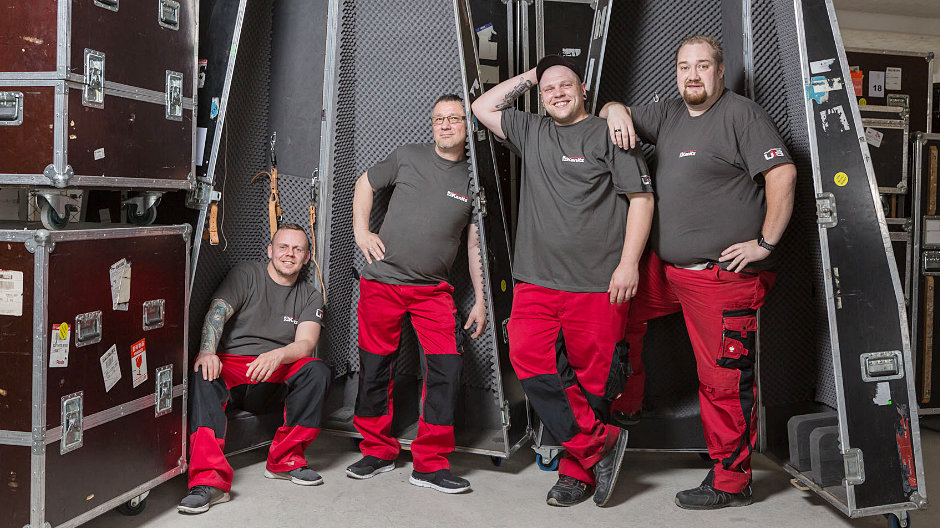
Berlin bluntness meets classical music. Tattooed lads and people wearing tailcoats and suits. Does that work? Sure it does! And for Kanitz freight company and the Berlin Philharmonic Orchestra it's a perfect fit.
Only at first glance is Kanitz a classic freight company for commercial and personal removals and storage facilities. The real speciality is transporting for theatres and orchestras – and if so wished, the transport company even organises the entire travel schedule for the musicians. They manage it so well that in addition to many renowned customers from the music scene, they also work for the Berlin Philharmonic Orchestra.
Since 1956, Kanitz have been accompanying the ensemble, as their regular transporter, so to speak: for example to the Royal Albert Hall in London, the Philharmonie de Paris and the Salzburg Festspielhaus. If the journey is going overseas, Kanitz takes care of transfers, using partner freight companies. In Europe, however, both partners prefer the safe way on asphalt – for Kanitz, that always means with the three-pointed star on the radiator grille. In the fleet, there are four Actros, two Atego, a Sprinter with a box body, and a bus.
“You're our transport angels.”
– Martin Heitmann
Heavy metal meets classical music.
Whilst strong men sit at the wheel who, they say, prefer to listen to heavy metal or rock guitar in their leisure time, behind them there's a whole orchestra stowed: with violins, xylophones, timpani and clarinets. “We transport Stradivaris and even a 16th century harp,” says Martin Heitmann. He has been working for Kanitz for 30 years as a driver and packer. What is the value of an orchestral transport? Heitmann winks and makes a movement as if he were sealing his lips with an invisible key and throwing it away.
He and his workmates know how the value of the instruments cannot be measured. And not only in money terms. Working together with the Philharmonic for decades has created a basis of trust that is worth more than money can buy. Some musicians will only entrust their treasure of treasures to Kanitz. Touching from outsiders: unacceptable. “You're our transport angels,” Heitmann recites proudly, something one of the members of the Philharmonic once said.
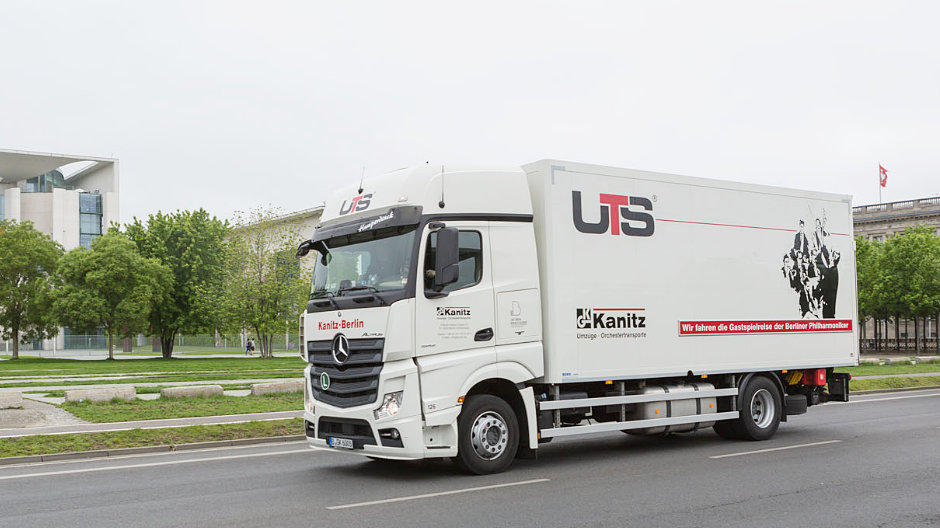
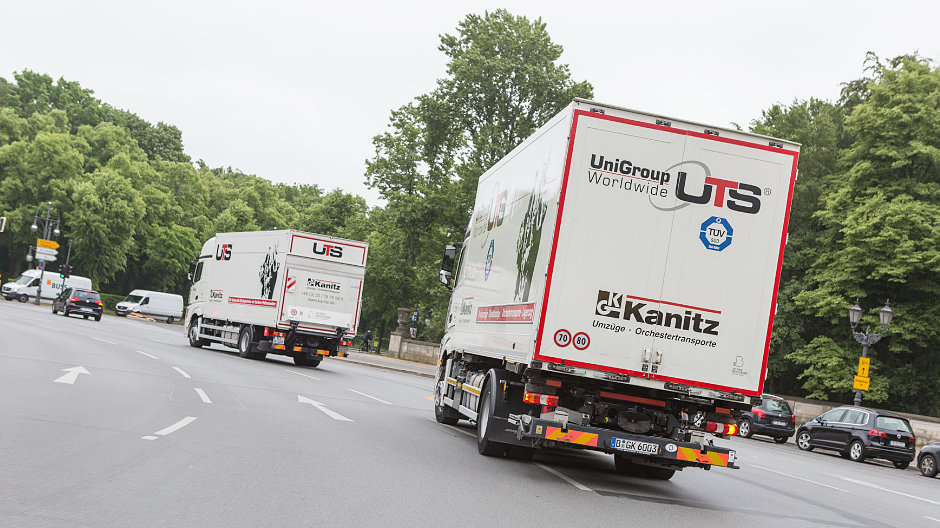
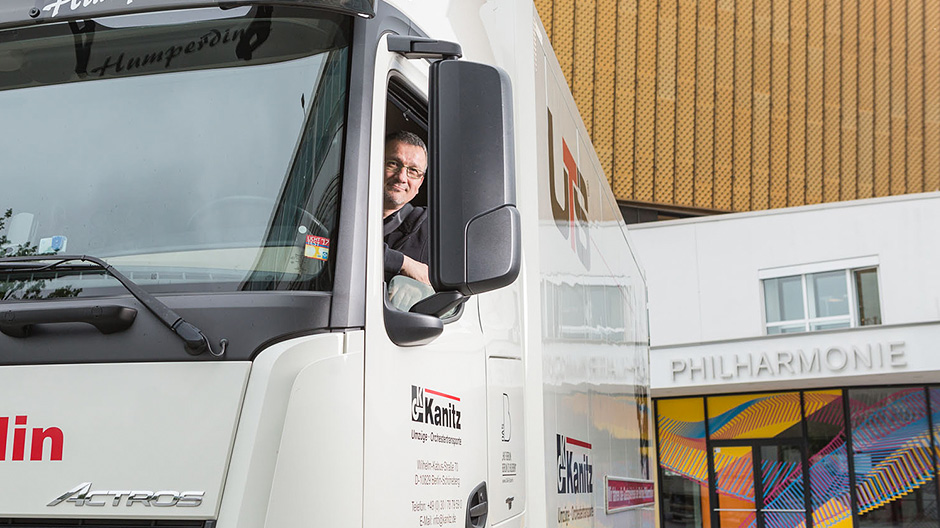
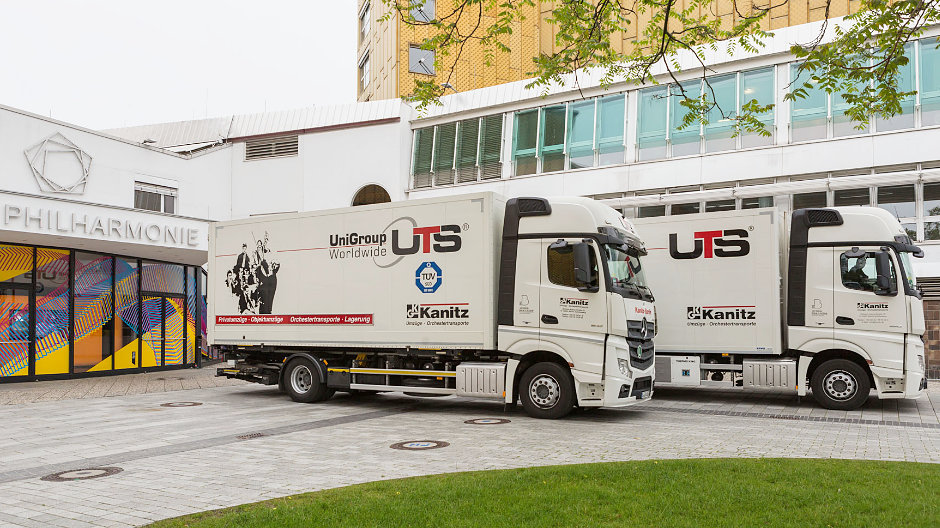
Also, each truck at Kanitz has a personal musical guardian angel. Company boss Jörg Noster baptises each new vehicle personally with a bottle of champagne and gives it the name of a composer. These are then enthroned on the front windscreen, easy to read for everyone: Ludwig van Beethoven, Georg Friedrich Händel, Peter Tschaikowski and Edvard Grieg.
Also, the hardware is just right too. The special vehicles from the
Kanitz fleet are perfectly adapted for orchestral transport, with
their suspension and heat-insulated and heated load platforms. “In the
load area we keep the temperature at a constant 24 degrees,” explains
Heitmann.
“So the wood of the instruments does not expand or contract, and the strings hardly need any tuning after they arrive.” The special transport cases for the instruments, known as cases in German too, can be kept at a constant temperature for twenty hours.
Some of the cases are in the Kanitz warehouse. The others are at the Berlin Philharmonie. Heitmann and his workmates have just driven there to prepare the next transport. Their destination: the rbb, the state radio corporation of the states of Berlin and Brandenburg. A standard trip for the men.
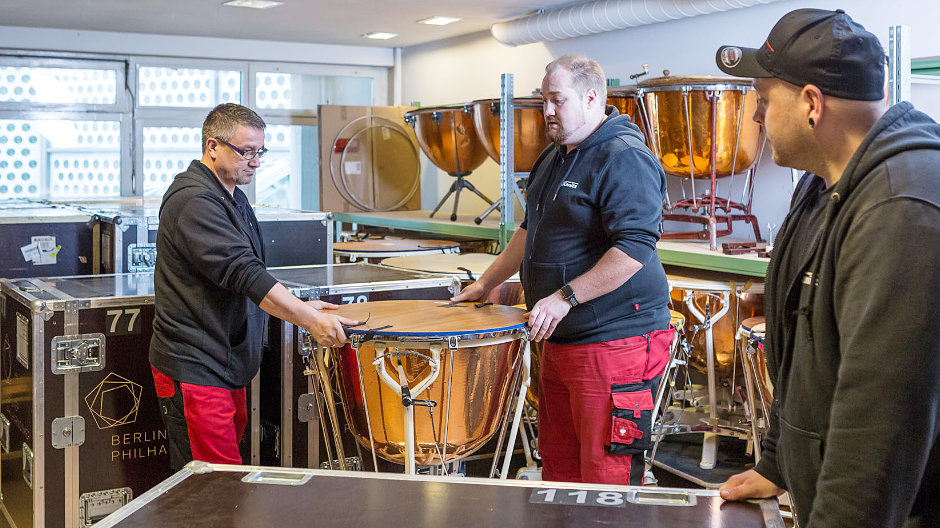
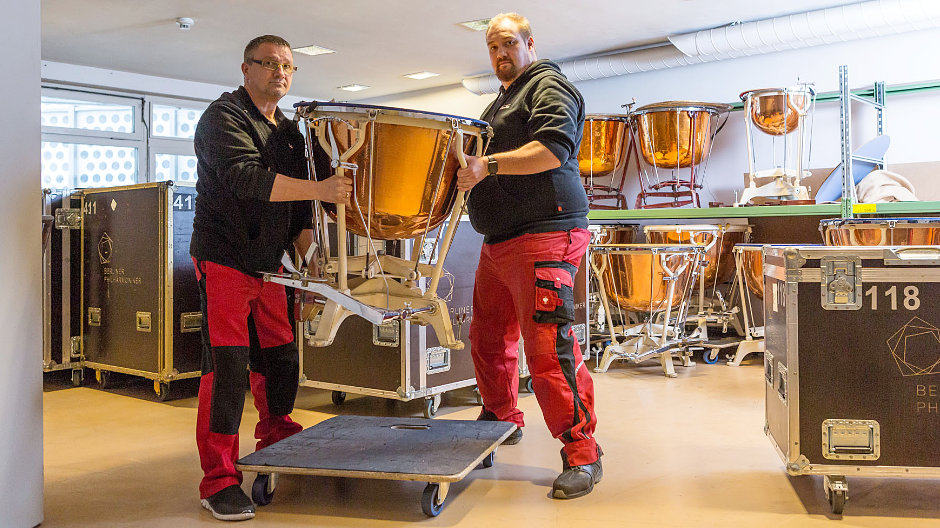
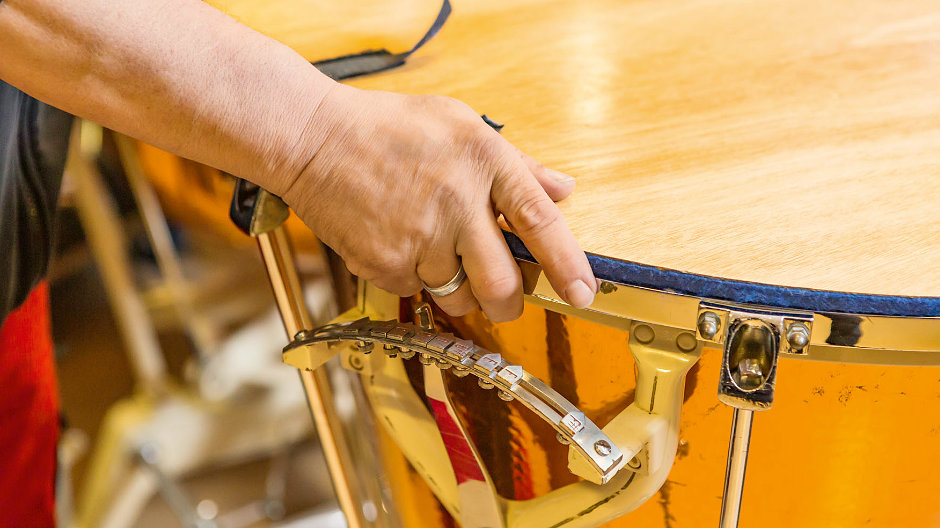
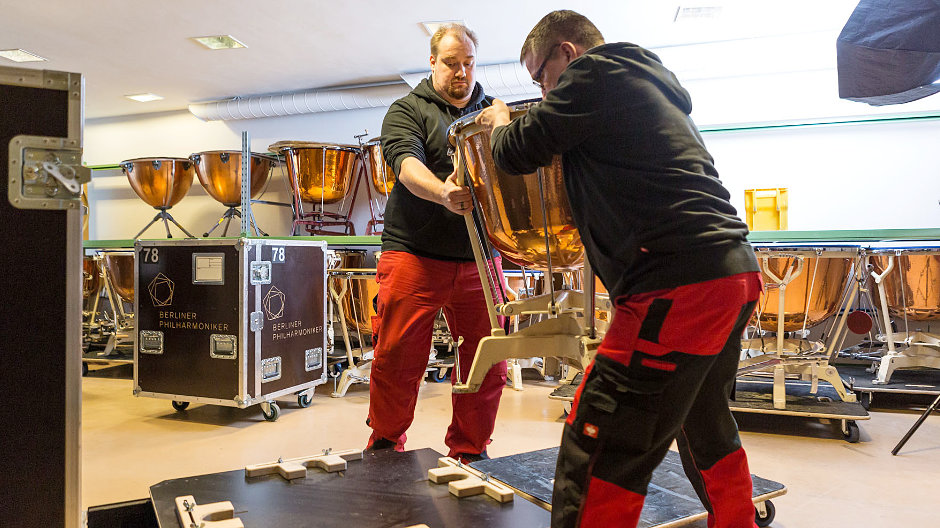
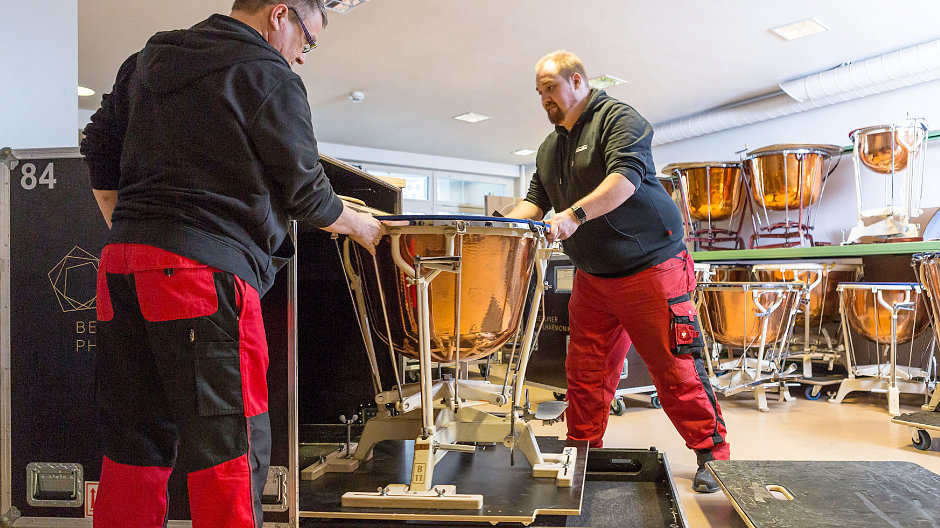
The Ten Commandments of Kanitz.
But first the Philharmonie: they have arrived at the concert hall and go confidently to the lift that takes the team to the artists' area. First floor: the canteen. In the background you can hear cutlery on china plates and quiet murmuring filling the room. The men have a short break to buy something to eat at the counter. They as good as belong to the ensemble. While they are waiting for their sausage with fries, ketchup and mayonnaise, more and more musicians come up to them. Hands are shaken, shoulders are patted and they all chat warmly and are on first-name terms.
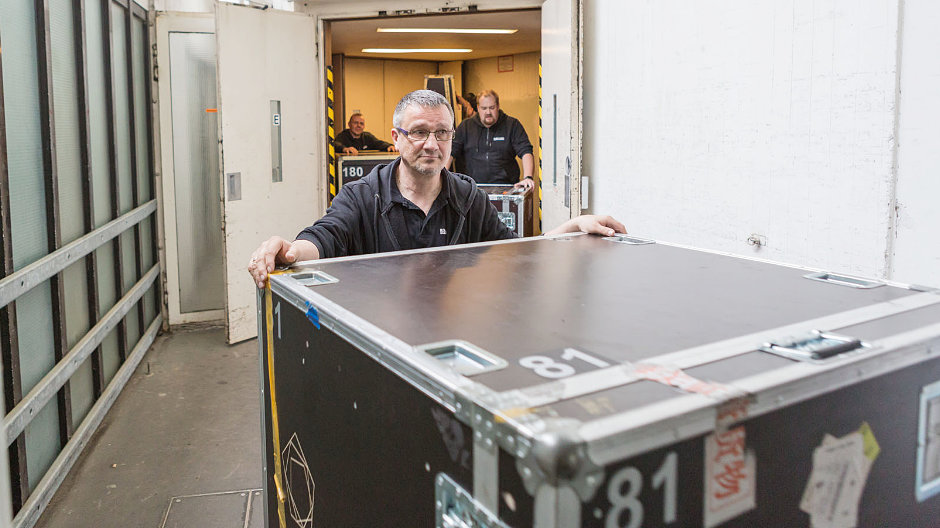
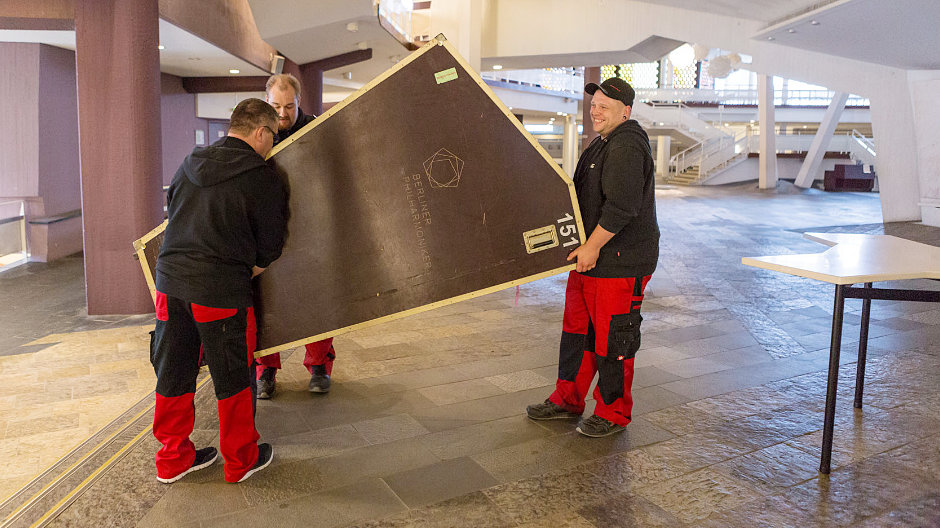
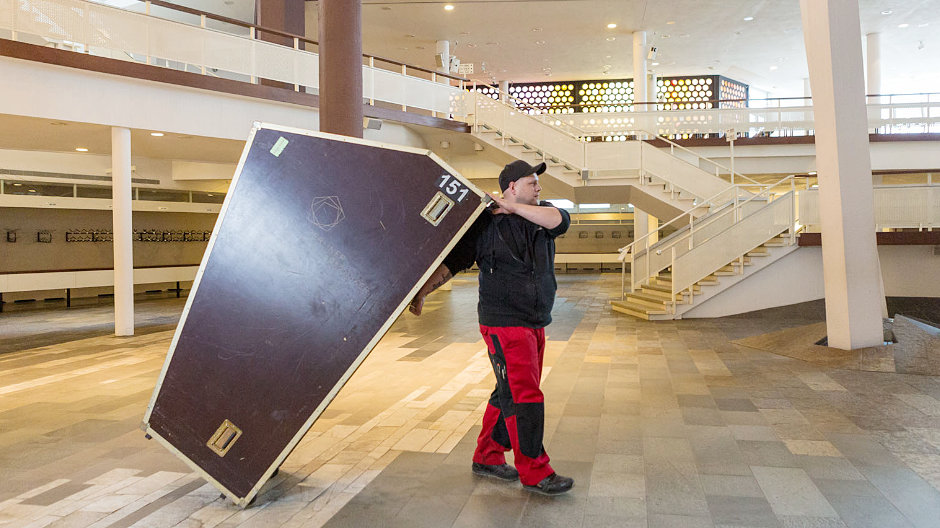
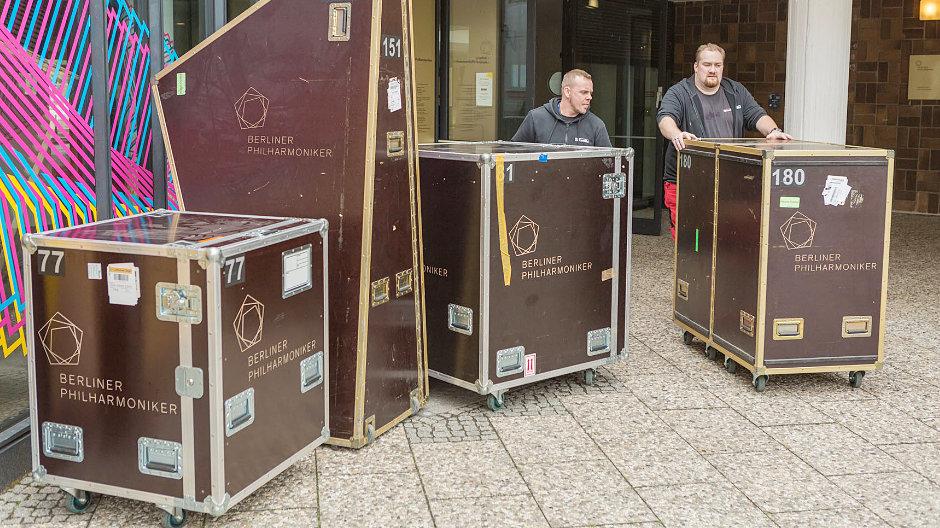
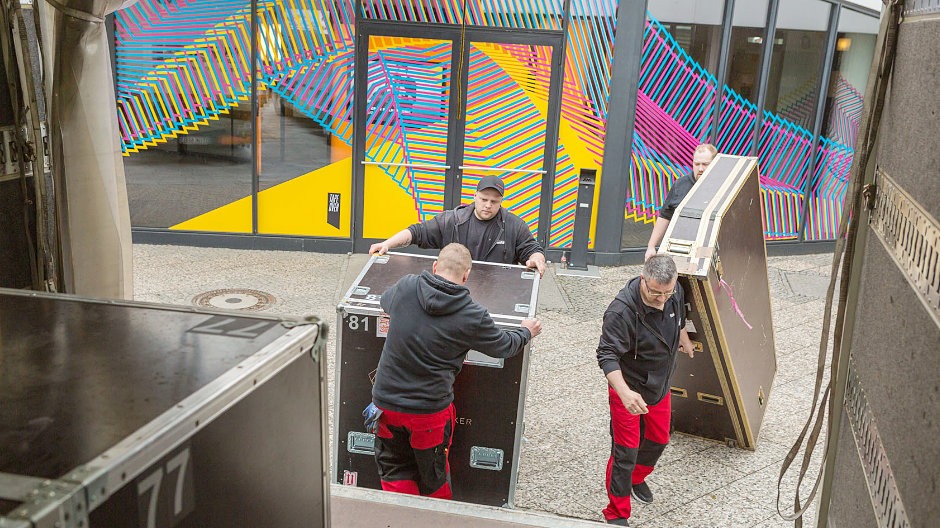
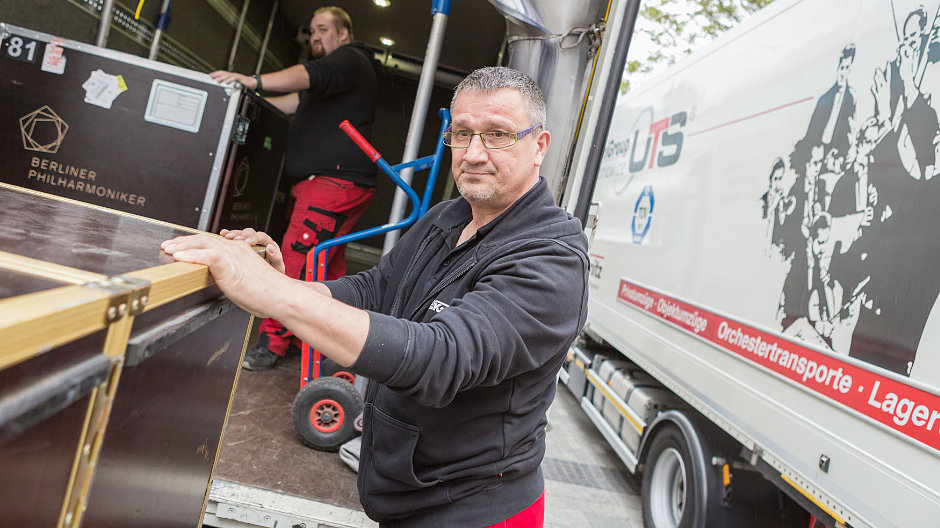
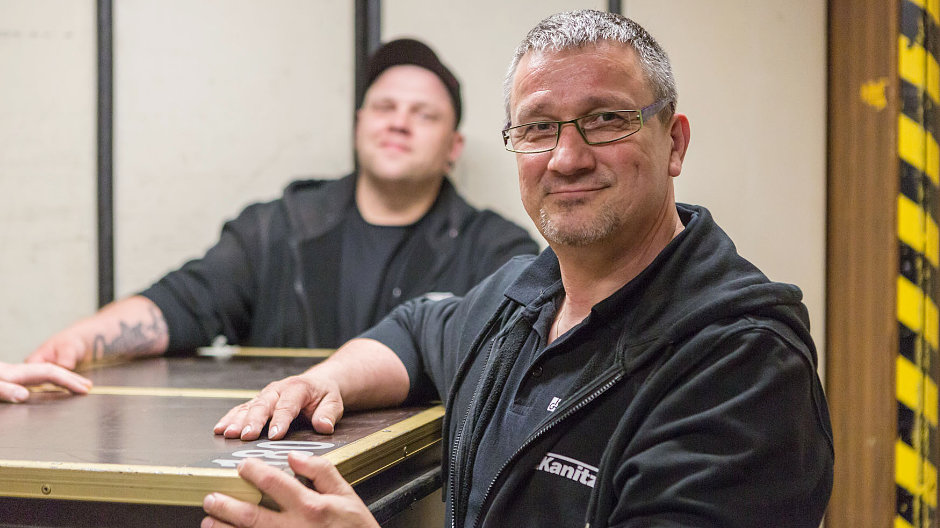
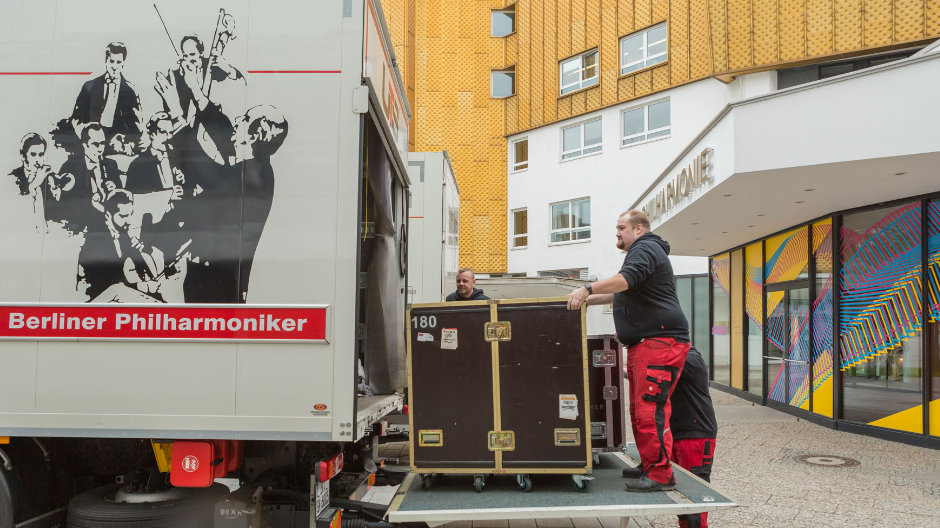
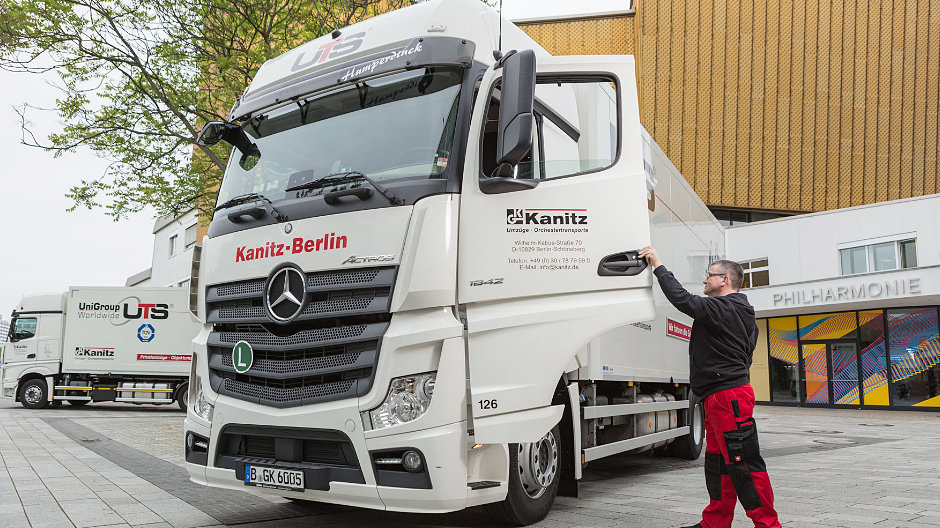
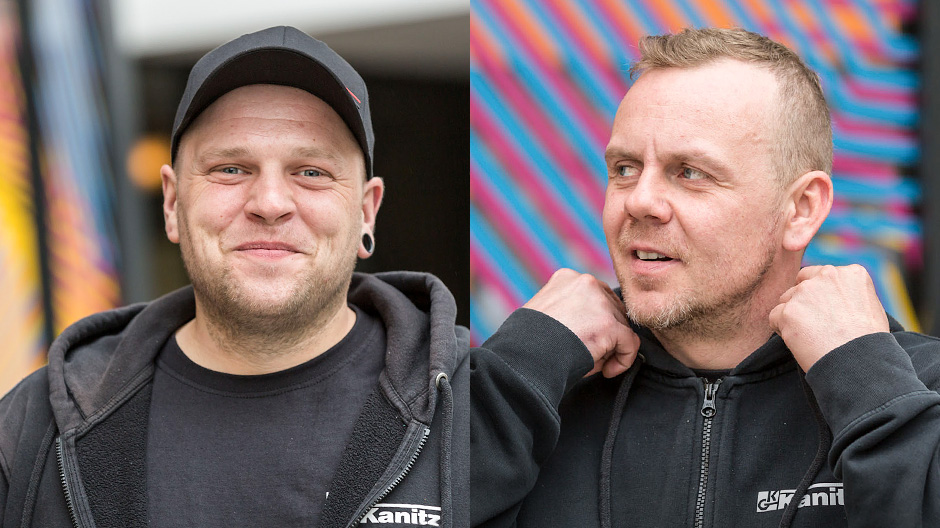
Back to the lift, second floor: the storage and rehearsal rooms. Somewhere you can hear musicians tuning instruments. Heitmann and his colleagues quietly start packing. A kettledrum goes into a special case. This looks tricky. How much does the whole thing weigh? “Oh, not too much,” they joke and laugh whilst wheezing a little. One of the company maxims is: “A member of the Kanitz staff only lies in answer to one question: Is it too heavy?” This saying hangs on the wall at the company headquarters, together with the nine other commandments. Another one is printed on the T-shirts: “A Kanitz worker never gets bruised: on the head, the cart or the box.” The Berlin workers always have a joke to laugh at. Which is a good thing. Kanitz and the Philharmonic – at first glance, those are contrasts like Kreuzberg and Charlottenburg or major and minor. But it's precisely these contrasts that go to make up a perfect composition. In this case such a special one that you can still enjoy listening to them after more than sixty years.
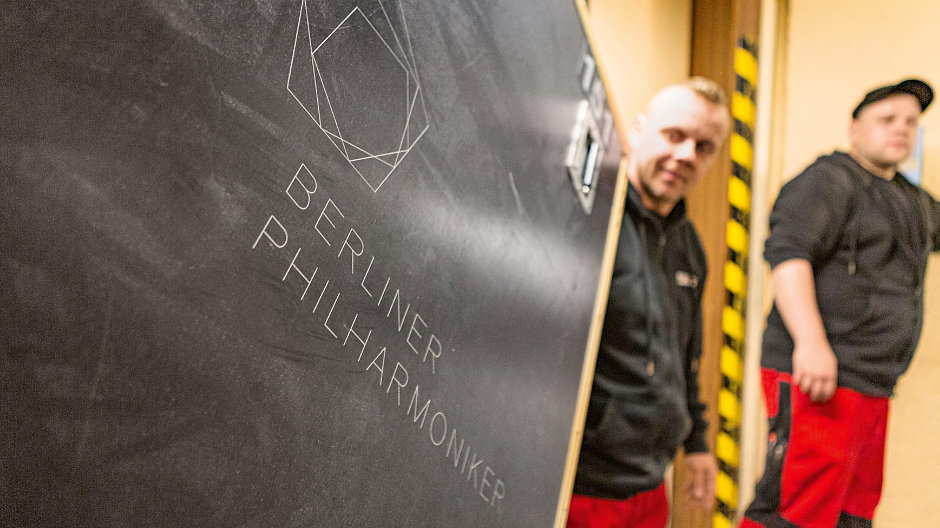
Photos: Kristian Barthen




Comment
Please log in to post a comment.
10 comments
Tolle Arbeit die Ihr da macht und das mit den Taufen und Namen der Lkw finde ich auch sehr nett.
Super Artikel und schöne Fotos.
👍👍👍👏👏👏💪💪😎⛟
Tolle Arbeit die Ihr da macht und das mit den Taufen und Namen der Lkw finde ich auch sehr nett.
Super Artikel und schöne Fotos.
👍👍👍👏👏👏💪💪😎⛟
Daß man da nicht über Wert der Ladung sprechen kann ist klar.
Trotzdem gefällt mir die Darstellung der Vielfalt an Transporten und Transportgütern hier bei roadstars!
Gruß
Klaus
Daß man da nicht über Wert der Ladung sprechen kann ist klar.
Trotzdem gefällt mir die Darstellung der Vielfalt an Transporten und Transportgütern hier bei roadstars!
Gruß
Klaus
Da muss man schon vorsichtig sein aber Instrumente zu transportieren ist ein ganz anderes Level weil diese wundervollen Instrumente und ihr Klang bewahrt werden muss das fänd ich nicht so toll für mich selbst aber bestimmt interessant für jene die bereit wären für solche Bereiche genau wie Geld und wert Transporte in meinen Augen
Da muss man schon vorsichtig sein aber Instrumente zu transportieren ist ein ganz anderes Level weil diese wundervollen Instrumente und ihr Klang bewahrt werden muss das fänd ich nicht so toll für mich selbst aber bestimmt interessant für jene die bereit wären für solche Bereiche genau wie Geld und wert Transporte in meinen Augen
Im Grunde mehr akkern als Fahren. Umzüge, Objekteinrichtungen oder eben das was die Jungs hier machen ist Knochenarbeit und grenzt teilweise an Extremsport. Ich weiß wovon ich rede. 15 Jahre bei der besten Umzugssoedition im Ruhrgebiet. "Ehrenberg" die haben einen ziemlich ähnlich guten Ruf.
Respekt an die Jungs und weiter machen! 💪😎👍
Im Grunde mehr akkern als Fahren. Umzüge, Objekteinrichtungen oder eben das was die Jungs hier machen ist Knochenarbeit und grenzt teilweise an Extremsport. Ich weiß wovon ich rede. 15 Jahre bei der besten Umzugssoedition im Ruhrgebiet. "Ehrenberg" die haben einen ziemlich ähnlich guten Ruf.
Respekt an die Jungs und weiter machen! 💪😎👍